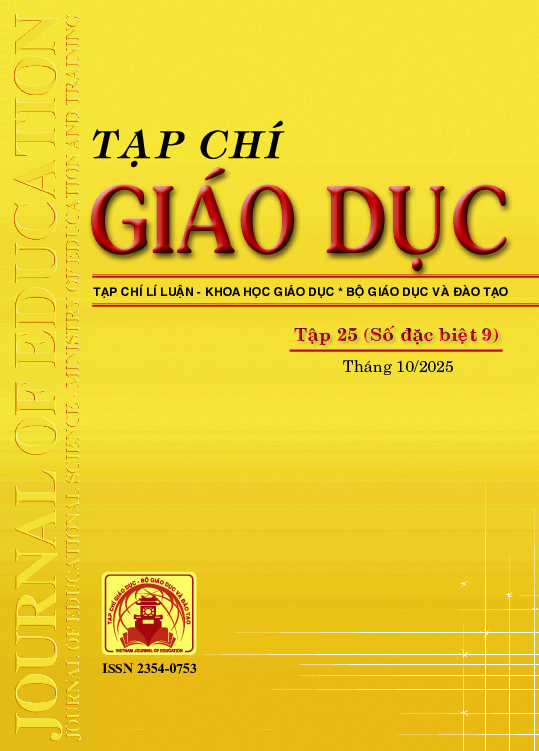Thực trạng giáo dục lòng biết ơn cho thiếu niên Phật tử tại một số địa bàn của thành phố Hà Nội theo tiếp cận trải nghiệm
Tóm tắt
Gratitude is a moral quality closely related to compassion and is identified as an essential attribute to be cultivated in students under the 2018 General Education Curriculum. However, in practice, gratitude education remains largely formalistic and overly theoretical. An experiential approach to education creates opportunities for learners to engage directly with real-life situations. Therefore, educating gratitude among Buddhist adolescents through an experiential approach is not only a timely demand but also an urgent requirement to enhance the effectiveness of moral education within the Buddhist context. The findings indicate the current state of content and forms of education based on the experiential approach that have been employed by educational stakeholders in fostering gratitude among Buddhist adolescents. These findings provide a foundation for proposing measures to improve the quality of gratitude education in particular and moral education in general for Buddhist adolescents.
Tài liệu tham khảo
Bono, G., Froh, J. J., Disabato, D., Blalock, D., McKnight, P., & Bausert, S. (2019). Gratitude’s role in adolescent antisocial and prosocial behavior: a 4-year longitudinal investigation. Journal of Positive Psychology, 14(2), 230-243. https://doi.org/10.1080/17439760.2017.1402078
Bộ GD-ĐT (2018). Chương trình giáo dục phổ thông - Chương trình tổng thể (ban hành kèm theo Thông tư số 32/2018/TT-BGDĐT ngày 26/12/2018 của Bộ trưởng Bộ GD-ĐT).
Chan, D. W. (2010). Gratitude, gratitude intervention and subjective well-being among Chinese school teachers in Hong Kong. Journal of Happiness Studies, 11(6), 829-842. https://doi.org/10.1007/s10902-009-9153-8
Dewey J. (1938). Experience and education. New York: Collier Books.
Emmons, R. A. (2016). The little book of gratitude: Create a life of happiness and well-being by giving thanks. Gaia.
Emmons, R. A., & McCullough, M. E. (2003). Counting blessings versus burdens: An experimental investigation of gratitude and subjective well-being in daily life. Journal of Personality and Social Psychology, 84(2), 377-389. https://doi.org/10.1037/0022-3514.84.2.377
Kolb, D.A. (1984). Experiential learning: experience as the source of learning and Development. Englewood Cliffs, New Jersey: Prentice-Hall.
Lê Thị Son (2024). Triết lí nhân sinh trong tín ngưỡng thờ cúng tổ tiên của cộng đồng người Việt ở Nam Bộ. Tạp chí Giáo dục, 24(8), 59-64.
Ngô Văn Trân (2013). Đạo đức Phật giáo với công tác giáo dục thanh, thiếu niên tín đồ Phật giáo Thừa Thiên Huế hiện nay. Luận án tiến sĩ Triết học, Học viện Khoa học xã hội Việt Nam.
Nguyễn Đức Chính (2019). Giáo dục đạo đức cho học sinh phổ thông trong bối cảnh đổi mới căn bản, toàn diện giáo dục Việt Nam. NXB Giáo dục Việt Nam.
Nguyễn Thị Mỹ Lộc, Nguyễn Thị Minh Hằng, Phạm Thành Nghị (2012). Giáo dục giá trị sống và kĩ năng sống cho học sinh phổ thông. NXB Đại học Quốc gia Hà Nội.
Nguyễn Thị Thu Hà (2017). Giáo dục kĩ năng sống cho thanh thiếu niên thông qua khóa tu mùa hè tại các cơ sở Phật giáo. Tạp chí Khoa học Trường Đại học Sư phạm Hà Nội, 62(5), 123-132.
Phạm Khắc Chương (1998). Giáo dục gia đình. NXB Giáo dục.
Rash, J. A., Matsuba, M. K., & Prkachin, K. M. (2011). Gratitude and Well-Being: Who Benefits the Most from a Gratitude Intervention? Applied Psychology: Health and Well-Being, 3(3), 350-369.
Thích Nhật Từ (2018). Đạo Phật với tuổi trẻ: Giáo dục đạo đức và lối sống trong thời kì hội nhập. NXB Hồng Đức.
Vũ Ngọc Giang (2024). Lòng biết ơn trong văn hóa Việt Nam. Tạp chí Khoa học, Trường Đại học Tân Trào, 19(10), 166-175.
Waters, L. (2019). Searching for wellbeing in schools: A new framework to guide the science of positive education. Journal of Educational & Psychological Research, 1(2), 1-8. https://doi.org/10.33140/JEPR.01.02.02
Đã Xuất bản
Cách trích dẫn
Số
Chuyên mục
Giấy phép

Tác phẩm này được cấp phép theo Ghi nhận tác giả của Creative Commons Giấy phép quốc tế 4.0 .












